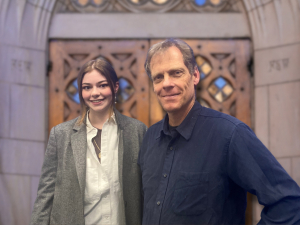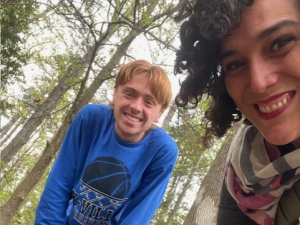
Keep Hope Alive
Chemistry professor Kathy Franz and student Sophia Kuhn (T’24) discuss the artistic side of chemistry, the rapid pace of technological advancements in the field and the value of persistence in overcoming challenges, especially when experiments don’t go as planned.
Related links:
The Franz Lab: Bioinorganic Chemistry at Duke University
Full Transcript
Welcome to Duets, a podcast exploring the human side of research collaborations between Duke faculty and undergraduate students.
Today we're joined by Professor Kathy Franz and student Sophia Kuhn, whose collaborative research in bioinorganic chemistry explores the design of antibiotic compounds to selectively target drug-resistant bacterial pathogens.
Kathy: I'm Kathy Franz, I'm a Professor of Chemistry in the area of bioinorganic chemistry or metals and biology. It's a subfield of chemistry that looks at the inorganic elements and what those do in biology. They're in many of your proteins and enzymes, and they're even in some of the small molecules that we're trying to discover to make you healthier.
Sophia: I'm Sofia Kuhn. I'm a Chemistry major and a Japanese language minor. I'm working on a research project looking into a set of different in antimicrobial candidates whose purpose is to select for antibiotic-resistant bacteria.
Kathy: So, Sophia, originally, you were interested in genetics research. I'm curious about that shift to chemistry, what was involved?
Sophia: So, I didn't realize how artistic chemistry can be. And as someone who has always loved to draw and play music, always gravitated towards art, I found a click with chemistry. I just fell in love with it.
Kathy: Most of what we do as chemists is study the unseen world, things that we can't see visibly with our eyes. We can see maybe the outcomes of them, but we can't actually see molecules. So, a lot of what chemistry is about is visualizing what the molecular scale looks like. So, that doesn't surprise me that somebody with an artistic background has an affinity for imagining what those molecules are like.
Sophia: What about you? How were you drawn to chemistry?
Kathy: I think there were a couple of inputs that made an influence. One is my dad was a chemist, he was a chemistry professor, actually. I grew up around it, you know, it wasn't something foreign or far out. The other was realizing in high school that all my friends hated chemistry and I was helping them with all of their homework. So, I though, okay, that must mean something. And then I did a junior semester in Berkeley, California. The Department of Energy had a program. And my advisor there, he had this project where they were using these metal chelating agents to extract metals out of old Montana copper mines. And I really liked that concept. And he's the one who said: you should go to graduate school, and you should go work for this person at this university. And I followed his advice.
Sophia: So, Kathy, when was the time in your career where your research made you feel hopeful?
Kathy: We have a phrase, you may have heard it around the lab, because we say it a lot. Or at least I do. Keep hope alive. Because your experiments don't always work. And I always put that in air quotes because — unless you, like, literally drop the flask on the floor and is gone and it didn't work because there was a technical mistake — experiments always teach us something. If we do them well, if we do a good experiment, there's something to learn from it. So, you're always keeping hope alive that you're learning something from it, even if it's not what you expected or it disproves your hypothesis, and then you just have to reframe it and go in a different direction. But to me, that's always keep hope alive, being hopeful that we will figure it out, and we'll learn something from it.
Sophia: Yeah, I love that answer. And I think keeping that sort of mantra of keeping hope alive kind of helped me stay focused and not feel too down if something didn't go exactly the way I wanted to.
Kathy: Absolutely. You can never take those things personally.
Sophia: They're molecules.
Kathy: Yeah. How about you, Sophia? What's the time when you were hopeful about what we were doing in the lab?
Sophia: So, I think for me, there's been a lot of different instances where my research made me feel hopeful about my own potential and future as a chemist. When I gave my first presentation to the lab, it was in a subgroup meeting, so it was more intimate environment, which I think helped introduce me to giving research presentations. But I'd spent a lot of time on making the slides pretty and practicing what I was going to say. And I think coming up in front of the group and delivering my presentation, even though I didn't have a huge set of data to present, being able to talk about my research, and introduce the topic, and describe, you know, the importance of what I'm researching. I felt really proud. It felt kind of like, oh, I did that.
Kathy: I remember that actually — your first presentation — because you did such a good job. It was so clear, and the slides were really good. But you knew the structures behind them and it really stood out. You did a great job.
Sophia: It kind of proved to me was like — okay, I can do this sort of high-level research, that I, in the beginning, felt very less than confident on. I think I began to kind of take hold of some of that confidence as an undergraduate researcher in the lab, and I felt like this is a community where I belong and that I can exist in, and that I can have a voice in this grand scheme of antibiotic research.
So, what do you think would be an important personality trait or character strength that someone would need to have to work in bioinorganic chemistry?
Kathy: I think for any kind of research field, delayed gratification is a big one. I think we go to talks or read papers, and it looks like everything just fell into place for somebody. Like, we tried this experiment, we got this amazing result, we're pushing the field, you know, at the cutting edge. And you don't realize that that professor who just gave that talk is giving you the last 10 years of research. It takes a lot of persistence and looking at problems in different ways and trying different experiments and piecing things together. So, people who want that immediate hit of, you know, this worked, can kind of flame out.
Sophia: No, I feel that. Having the strength and resiliency to keep moving forward is something that I've seen in the members of our lab, and that inspires me.
Kathy: Yeah. Because if everything worked perfectly, then probably somebody would have already done it. We’re doing things in the lab that haven't been done before.
Sophia: Yeah
Kathy: It’s usually not neat and tidy. It's usually pretty messy and frustrating.
Sophia: Yeah. I think research isn't really about things going right. I think a lot of times, research is about things not going quite well — and that's where a lot of the learning happens.
How has bioinorganic chemistry changed since you were an undergraduate student?
Kathy: Yeah, I think some of the biggest changes — not necessarily, specifically within the field, but just the process of doing research — are some of the technology advances and the way we communicate, down to the way we publish things and submit manuscripts. Some of these things are just, like, the pace of that technology change is so rapid. I feel like I've already been through several generations of that.
Sophia: Yeah.
Kathy: This sounds just so, like ‘Oh, back in my day’ but, you know, we were the first generation to get email addresses in college. Now, like what I would do to get rid of my email inbox.
Sophia: Are there ways in which you wish it could kind of go back to some of the earlier methods?
Kathy: Yeah, I’m not somebody who goes back and wishes for the good old days. I mean, I like to move forward. But I think there are some lessons in figuring out how to think through things methodically and slowly. There are some things that just don't help to move fast through. And some of the advances in technology make that feel like we should be moving faster, faster, faster. But what do we really need to understand? Maybe we need to slow down to understand it before we rush to embrace the next thing.
I'm curious on your side, coming in as a digital native, what things do you see that you're excited about or that you think are moving too fast?
Sophia: I think for my generation, there's been kind of a pushback on just how quickly technology has been advancing, especially with AI. But I think for me, being able to access things like an HPLC MS machine, being able to utilize 700 MHz NMR machine — that's just so incredibly impressive, and sometimes I'm doing these experiments on these very, very expensive machines and I have to take a second to be like, oh my gosh, that's just such a huge privilege and opportunity to have as an undergraduate researcher, just right at the start of my career. And already being able to do so many complex experiments is just such a wonderful thing.
Kathy: You can learn more about the research we do in the Franz Lab, just search our website Franz Lab at Duke and you'll find information about the people in the lab, the projects and publications. Look for a publication that will include Sophia as a co-author.
Senior Editor and Producer: Cara August (Trinity Communications)
Audio Editor and Mixer: Marc Maximov
Music Composition: Grace Davis (T’26)
Production Sponsor: Trinity College of Arts & Sciences at Duke University
Recording Date and Location: March 2024, Bryan Center Studios
Duets is produced by Trinity College of Arts and Sciences at Duke University.



